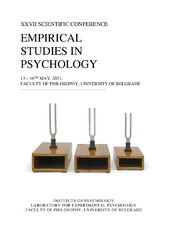| dc.description.abstract | The connection between leisure activities and values in adolescence is seldom investigated. Rare studies usually focus on particular leisure aspects and several related values. This paper aims at examining the link between these domains more systematically. Hence, the main goal is to analyse the relationship between various leisure activities and Schwartz’s 10 basic values in adolescents. The sample included 1,349 Serbian high-school students (44% boys; 62% vocational schools). The leisure-time questionnaire consisted of item groups related to hobbies, sports, following of different themes/shows in the media (TV, Internet, magazines), listening to music, going out, attending cultural and sports events, the Internet and social networking activities. Values were examined by the PVQ21 questionnaire. Factor analysis yielded 7 factors underlying 49 leisure activities (45.96% explained variance) defined by the following contents: pop culture; culture, art and music; movies, TV-shows and the Internet; science and politics; IT; going out; sports. A regression analysis including basic values as the predictors showed that different activities were significantly related to distinctive values sets. Activities related to pop culture are predicted by Power (β = -.21), Tradition (β = -.19), Conformity (β = -.14) and Self-direction (β = -.10). Universalism (β = .22) and Self-direction (β = .21) are the most important predictors of the activities in the field of culture, art and science, and Stimulation (β = .13) and Hedonism (β = .12) of those related to watching movies, TV-shows and online activities. Lower Hedonism (β = -.16) and higher Security (β = .14) predicts activities in the field of science and politics, and Self-direction (β = .13), Stimulation (β = .12) and Power (β = .10) in the field of IT. Students who find Hedonism (β = .21), Power (β = .12) and Stimulation (β = .08) important tend to go out more. Those who value Tradition (β = -.13) and downplay the importance of Universalism (β = -.10) follow sports. The analysis further showed that different leisure activities were differently predicted by Schwartz’s higher-order values, Self-transcendence vs. Self-enhancement and Openness for change vs. Conservation values. The main conclusion is that values are important motivators of activities during free time and that different values are mostly expressed through different activities, but also that different activities can be motivated by the same basic values | sr |

